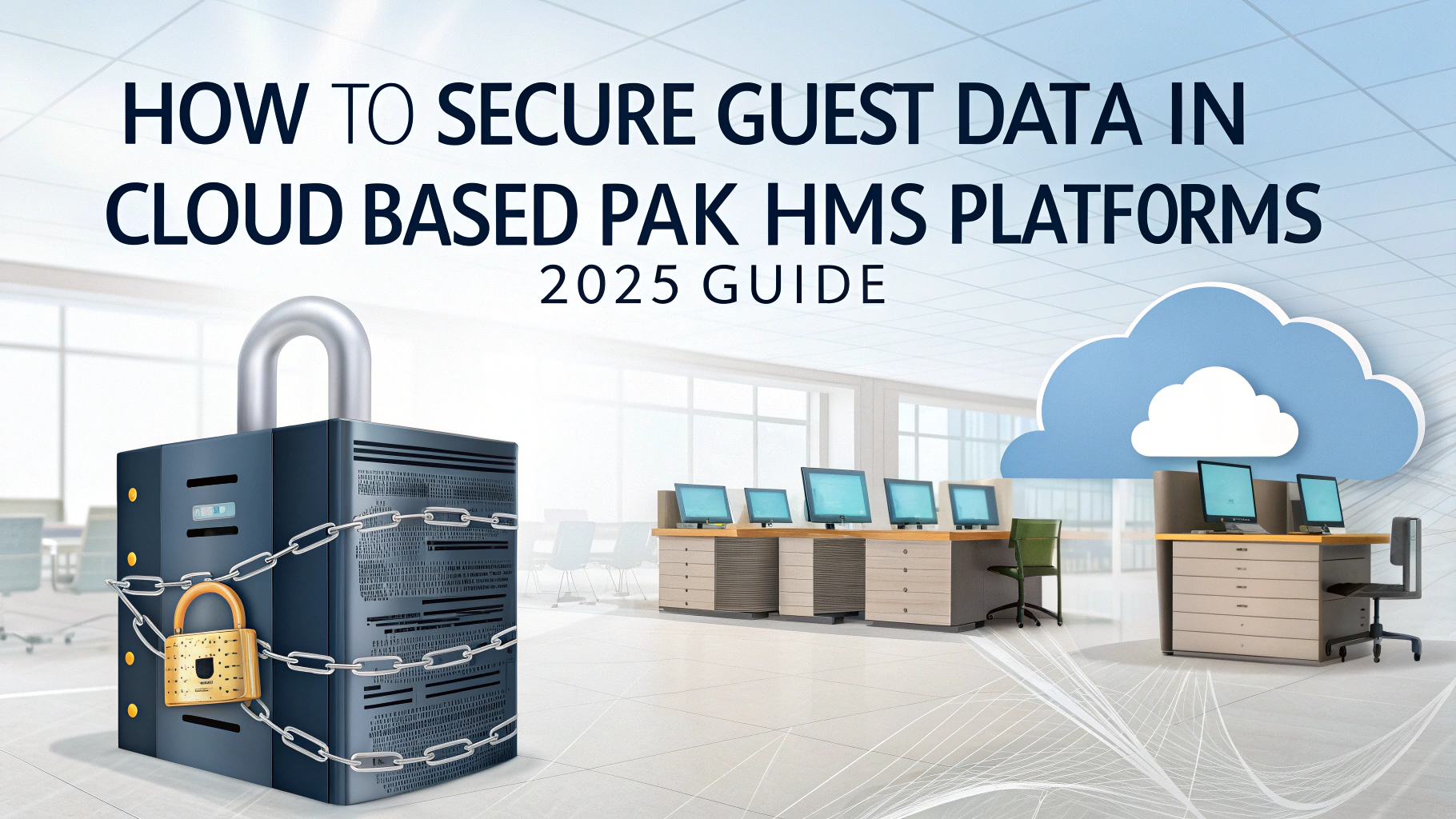How to Secure Guest Data in Cloud Based PAK HMS Platforms (2025 Guide)
As hotels increasingly shift to cloud-based systems to manage bookings, operations, and guest engagement, a new question arises: Is guest data safe in the cloud?
In 2025, cloud-based Hotel Management Systems (HMS) are no longer an emerging trend—they are the standard. But with that advancement comes increased responsibility. Storing guest names, ID scans, credit card numbers, contact details, and preferences on cloud servers demands rigorous data protection policies and practices.
This is especially relevant for platforms like PAK HMS, Pakistan’s leading cloud-based HMS provider, which serves a growing number of independent hotels, franchises, and resort chains across the region.
In this blog post, we’ll explore:
- Why securing guest data matters more than ever
- The key risks of cloud-based hospitality platforms
- How PAK HMS protects sensitive data
- Best practices hoteliers can adopt to stay compliant and cyber-secure
💣 The High Stakes of Guest Data Protection
Every hotel collects valuable guest data—used for reservations, marketing, loyalty, and personalized experiences. However, this data can also be a target for cybercriminals.
🔥 Consequences of a Data Breach:
- Loss of guest trust
- Hefty legal penalties (e.g., GDPR, local laws)
- Negative PR and brand damage
- OTA de-listing for non-compliant properties
- Potential operational shutdowns
According to IBM’s Cost of a Data Breach Report (2024):
“The average cost of a hospitality industry breach is $3.2 million, with 75% of attacks targeting guest data.”
This makes data security not just an IT concern—but a strategic priority for every hotelier.
🌐 Why Cloud-Based HMS Platforms Are Safer (When Done Right)
Cloud HMS platforms like PAK HMS offer several security advantages over traditional on-premise servers, such as:
| Cloud-Based HMS Advantages | Benefits |
|---|---|
| Professionally managed security | Dedicated teams monitor for vulnerabilities |
| Real-time updates & patching | Security flaws are fixed immediately |
| Geo-redundancy & backups | Data loss due to disaster is minimized |
| Encrypted transmission & storage | Guest data is unreadable without proper keys |
| Scalable authentication methods | Multi-factor, role-based, and biometric logins |
But only if the HMS provider and hotel implement robust practices at every level.
🔐 How PAK HMS Secures Guest Data in the Cloud
PAK HMS uses enterprise-grade security protocols across its infrastructure, applications, and internal policies. Let’s break it down.
1. End-to-End Data Encryption
- In transit using TLS 1.3 (the latest secure protocol)
- At rest using AES-256 encryption, the gold standard used by banks and governments
This means even if data is intercepted or accessed unlawfully, it’s useless without the encryption keys.
2. ISO 27001-Compliant Infrastructure
- Hosted on ISO 27001-certified cloud providers (AWS, Azure)
- Rigorous physical & digital security standards
- Periodic penetration testing
- Backup systems and geographic redundancy
3. Role-Based Access Control (RBAC)
- Granular permissions by job role
- Track access logs (who viewed, edited, or exported data)
- Auto revoke access for ex-employees
- Restricted views for sensitive fields
4. Multi-Factor Authentication (MFA)
- Password + OTP (one-time passcode)
- Biometric login on mobile devices
5. Regular Security Audits & Penetration Testing
- Quarterly internal audits
- Annual third-party penetration testing
- Real-time vulnerability scanning
6. Automatic Backups & Disaster Recovery
- Daily backups across geo-zones
- Failover systems for resilience
- Data recovery under 1 hour
7. Guest Data Anonymization for Analytics
- Data masking & tokenization
- Analytics without personal identifiers

🧠 What Hoteliers Should Do: 10 Best Practices
🔟 Best Practices for Hotels Using PAK HMS:
- Enable Multi-Factor Authentication
- Review and update user roles
- Change passwords every 90 days
- Avoid shared logins
- Train staff on phishing threats
- Revoke access for ex-employees
- Only collect necessary data
- Use encrypted Wi-Fi, avoid public networks
- Set data retention rules
- Always get guest consent for marketing
⚖️ Legal Compliance and Local Law Alignment
PAK HMS aligns with:
- GDPR: For hotels handling EU guests
- CCPA: For US customer interactions
- Pakistan’s Personal Data Protection Bill (expected 2025)
🔍 Red Flags to Watch for in Other HMS Vendors
- No encryption
- No consent tracking
- Unclear data storage locations
- No audit or penetration test records
- Unlimited staff access
🧩 Integrations: How PAK HMS Keeps Data Safe Across Connected Systems
- Tokenized APIs for secure data sharing
- OAuth-based authentication
- Consent-aware marketing sync
- Data masking for exports
📈 Real Hotel Example: Cloud Security Transformation
Hotel Name: Midtown Business Hotel, Lahore
Challenge: Offline system with USB backups, laptop theft caused 3 years of data loss.
Solution with PAK HMS:
- Migrated to cloud in 2 weeks
- Enabled MFA & RBAC
- Staff trained on phishing & password safety
- Encrypted cloud backups enabled
Results:
- Reduced IT costs by 22%
- No data loss in 18 months
- Earned “Digital Security Badge” from OTA partner
- Improved guest trust & reviews
🔮 The Future of Data Security in Hotel Tech (2025–2026)
- Blockchain-based audit trails
- Biometric staff & guest logins
- Geo-fencing alerts
- Guest-controlled data profiles
- Quantum-resistant encryption
✅ Final Thoughts
Guest data is sacred. In the digital age, protecting that data is the foundation of guest trust, regulatory compliance, and brand reputation.
With PAK HMS, your hotel benefits from:
- Bank-grade encryption
- Compliance with global & local privacy laws
- Scalable access controls & logging
- Intelligent threat detection & backups
- A security-first innovation ecosystem



Leave A Comment